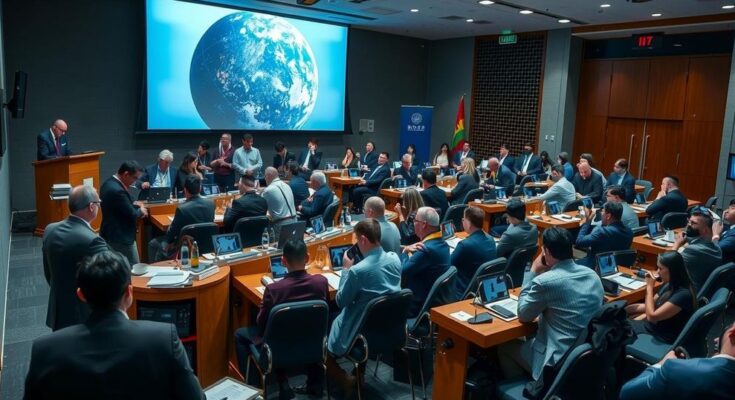The UN climate talks COP29 faced significant challenges as negotiators struggled to finalize a deal on financial support for developing nations, proposing US$250 billion annually by 2035, which fell short of the US$1 trillion needed. Frustrated nations and activists expressed disappointment over the inadequate funding levels and called for substantial commitments from wealthier countries to honor their Paris Agreement obligations.
The UN climate talks, identified as COP29, extended beyond their scheduled conclusion amid growing frustration among negotiators, particularly regarding financial commitments for climate action in developing nations. The proposed draft agreement suggested an increase in climate financing to US$250 billion annually by 2035—a significant rise from past objectives but insufficient compared to the estimated US$1 trillion required. U.S. climate envoy John Podesta indicated ongoing efforts to reconcile differences as discussions continued well into the night.
Vulnerable nations, severely impacted by climate issues largely resulting from the emissions of developed countries, are advocating for US$1.3 trillion to address various climate challenges, including adaptation strategies and energy transitions. Some wealthy nations contend that the US$250 billion target is a realistic goal given their own economic constraints. Nonetheless, many representatives from lower-income countries criticize the proposed funding, with leaders asserting that developed nations must commit more substantial resources to honor their obligations from the 2015 Paris Agreement.
Activists expressed their dissatisfaction with the current draft, conducting a silent protest outside the negotiation rooms, emphasizing their discontent with what they perceive as inadequate financial provisions. Youth activists, in particular, exhibited a mix of mourning and resilience, vowing to continue fighting for climate justice despite the outcome of the talks. Notable voices have stressed that the responses from developed nations are unacceptably minimal, calling for significant financial contributions rather than vague promises, scrutinizing the failure to meet the challenges posed by climate change effectively.
The news continues to unfold as a backdrop of global climate negotiations unfolds, emphasizing the urgency of the climate crisis and the responsibilities of wealthier nations to address the needs of those disproportionately affected by its consequences. Key stakeholders remain vigilant, advocating for a more robust financial commitment to ensure a meaningful response to the climate emergency.
The annual UN climate talks, known as COP conferences, are a crucial platform where nations negotiate agreements to address climate change on a global scale. These talks are pivotal for discussing financial support for developing countries to cope with climate impacts and transition to sustainable energy sources. The 2015 Paris Agreement is a cornerstone of these discussions, establishing the commitment of wealthier nations to assist vulnerable countries financially. Given the increasing frequency of climate-related disasters, the need for substantial and effective financial commitments has become more pressing.
The ongoing COP29 climate talks have highlighted substantial gaps between proposed financial commitments and the needs of developing nations facing the relentless challenges of climate change. Activists and representatives from vulnerable countries persistently advocate for increased funding to uphold commitments outlined in the Paris Agreement. The insufficient proposals on the table reflect broader concerns about the accountability of developed nations in addressing climate-induced inequities, emphasizing the need for immediate action and fair financing to combat the global climate crisis.
Original Source: www.taipeitimes.com




